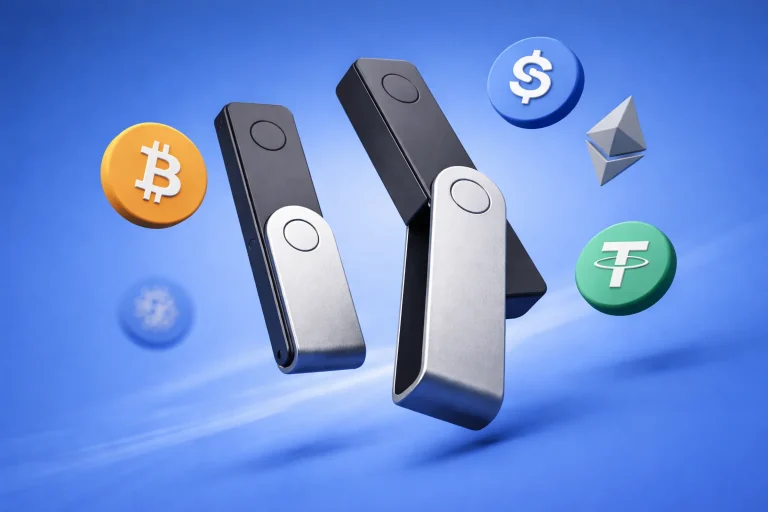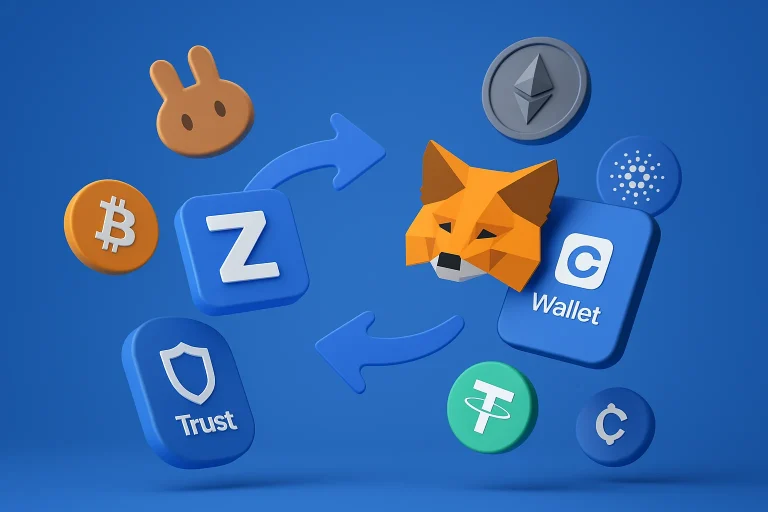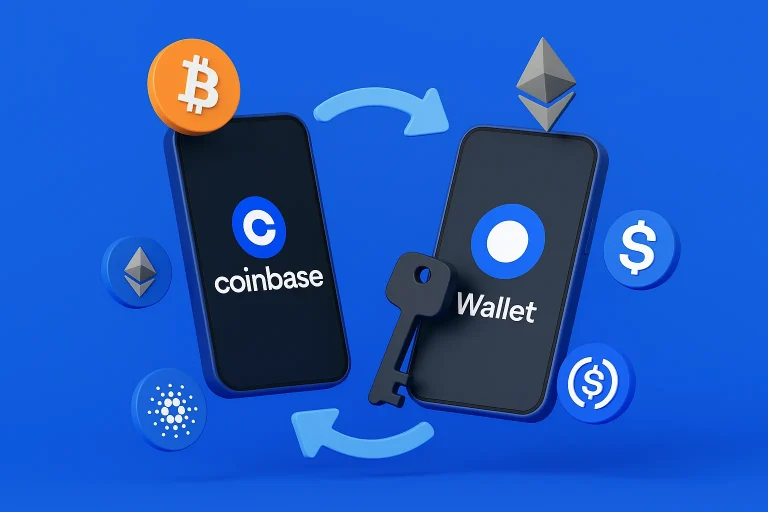Choosing the right cryptocurrency wallet isn’t easy, especially with the numerous options available. For most users, the decision often comes down to MetaMask vs Trust Wallet, two of the most popular crypto wallets in the crypto space.
Both offer secure, non-custodial storage but differ in key areas such as blockchain compatibility, user experience, support for DeFi, NFTs, and staking.
This guide breaks down the key differences between MetaMask and Trust Wallet to help you decide which best fits your crypto needs, whether you’re just starting out or already deep into Web3.
See also our MetaMask vs Coinbase in-depth guide for a broader perspective on how MetaMask works and its capabilities.
Table of contents
Quick Comparison: MetaMask vs Trust Wallet | |
|---|---|
| MetaMask | Primary Use: Web3 gateway, DeFi focus Supported Blockchains: 10+ networks Platform Availability: Browser extension, mobile app Built-in DEX: MetaMask Swaps Staking Support: Limited NFT Support: Basic viewing Security Features: Hardware wallet integration User Experience: Technical, DeFi-oriented Company: ConsenSys |
| Trust Wallet | Primary Use: Mobile-first, user-friendly Supported Blockchains: 100+ blockchains Platform Availability: Browser extension, mobile app Built-in DEX: Trust Wallet DEX Staking Support: Extensive (24+ cryptocurrencies) NFT Support: Advanced marketplace Security Features: Biometric authentication User Experience: Intuitive, beginner-friendly Company: Binance |
MetaMask vs Trust Wallet: Feature-by-Feature Breakdown
The following sections will examine the key features that set MetaMask and Trust Wallet apart.
1. Blockchain & Network Support
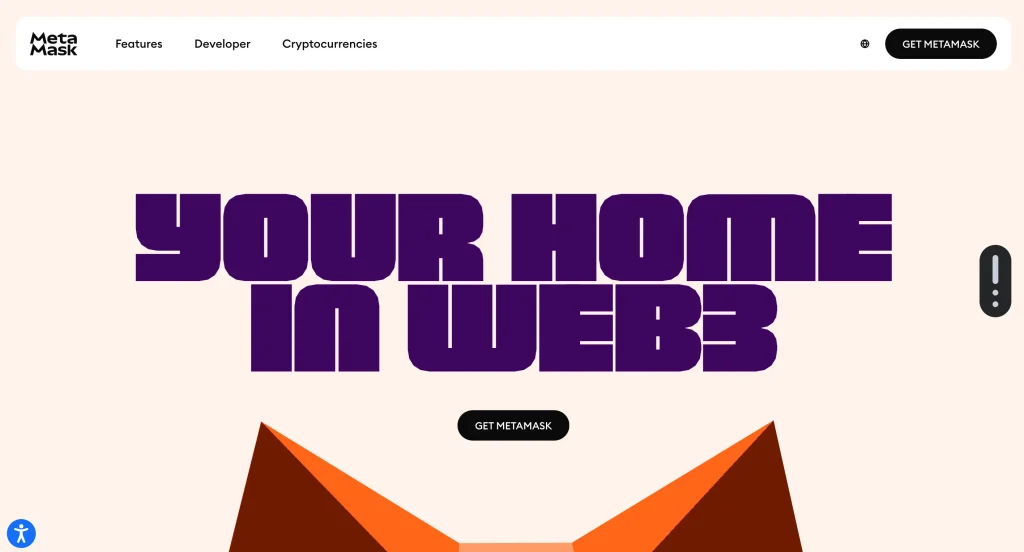
Initially built for the Ethereum ecosystem, MetaMask wallet has evolved to support all EVM-compatible networks. This includes major blockchains like:
- Binance Smart Chain (BSC);
- Polygon;
- Arbitrum;
- Optimism.
If you’re focused on Ethereum and related chains, MetaMask delivers solid, reliable connectivity. However, adding new networks often requires manual setup, which may not be ideal for beginners.
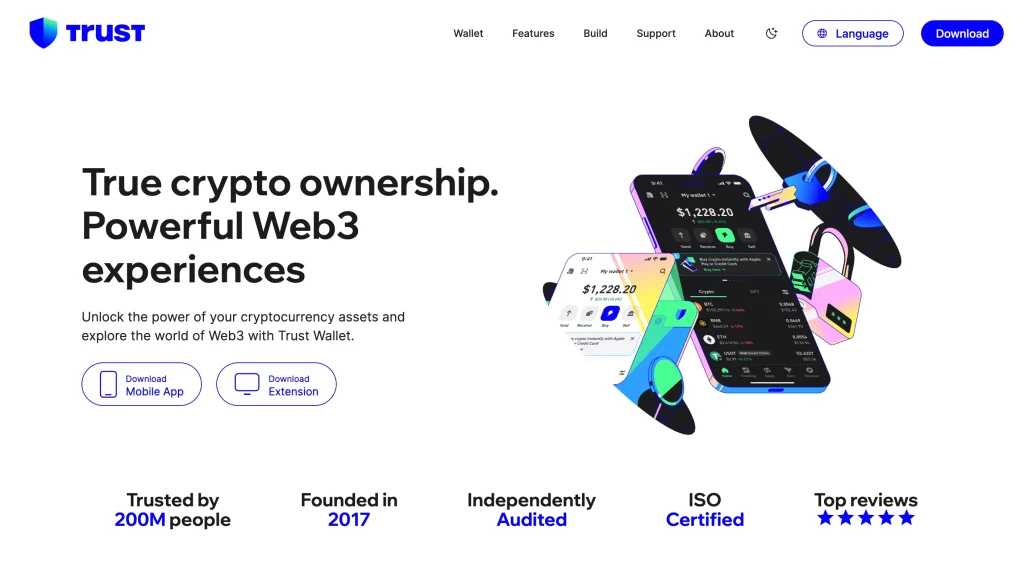
Trust Wallet stands out for its broad multi-chain support. It natively supports over 100 blockchains, covering a wide range of ecosystems such as:
- Bitcoin;
- Solana;
- XRP;
- Cardano.
Trust Wallet is a clear winner for users with a diverse portfolio of crypto assets. It offers seamless access to millions of digital assets, all from a single app, with no manual configuration needed.
This level of flexibility makes it a top-tier mobile wallet for users managing assets on the go.
2. User Interface and Experience
MetaMask offers a powerful desktop experience through its browser extension, making it a favorite among DeFi users and developers. The interface is more technical and better suited for those comfortable navigating Web3.
Trust Wallet is designed for simplicity. Its clean mobile UI makes it easy for beginners to store, send, stake, and trade crypto. The newly added desktop extension bridges the gap but still feels mobile-first.
Choose MetaMask for advanced control. Trust Wallet for everyday simplicity, enabling users to manage their assets easily. A perfect example of catering to different user preferences.
3. DeFi and dApp Integration
MetaMask is the go-to wallet for interacting with Ethereum-based dApps. It integrates seamlessly with platforms like Uniswap, OpenSea, Aave, and hundreds more. Most DeFi protocols recognize MetaMask by default.
Trust Wallet also offers dApp integration via its in-app browser, but it supports multi-chain dApps, including Solana and BNB Chain-based platforms, where MetaMask doesn’t operate.
MetaMask is ideal for Ethereum/DeFi power users; Trust Wallet gives you cross-chain DeFi access.
4. Security Features
Both wallets are non-custodial, meaning you control your private keys.
MetaMask security highlights:
- Local encryption of private keys stored on your device.
- Password protection and auto-lock functionality for added safety.
- Open-source code makes it transparent and publicly auditable.
- Hardware wallet support (e.g., Ledger, Trezor) to keep private keys offline.
- Blockaid alerts are a new feature that warns users about potential scams and risky transactions.
Trust Wallet security highlights:
- Biometric authentication (Face ID, Touch ID) for quick and secure access.
- PIN code protection and required seed phrase backup during setup.
- Open-source and subject to regular security audits.
- Hardware wallet integration for users who want offline key storage.
MetaMask offers slightly more advanced protections for technical users; Trust Wallet prioritizes mobile security and ease.
5. Trading & Swapping
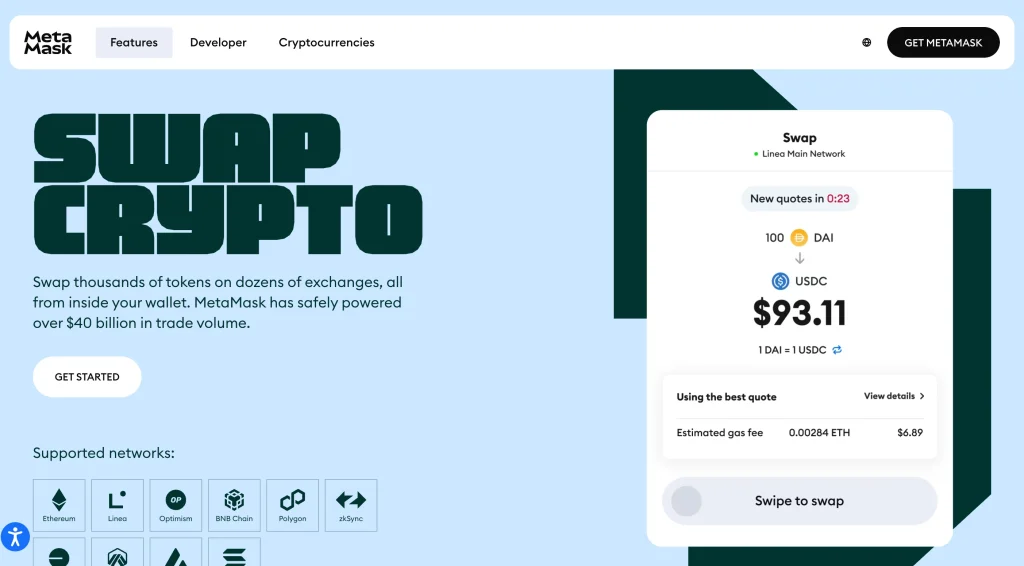
MetaMask Swaps aggregates rates from multiple DEXs to offer competitive pricing. However, it charges a 0.875% service fee and a gas fee.
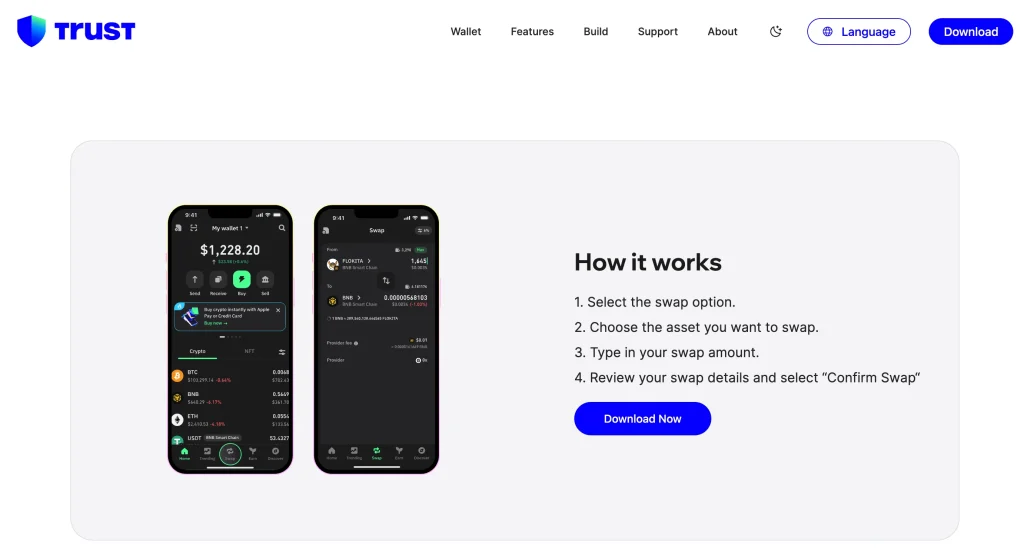
Trust Wallet enables fee-free token swaps via its native DEX integration, which is particularly useful for Binance Smart Chain and other supported networks. It also supports fiat purchases through third-party providers.
Trust Wallet is more cost-efficient for frequent swappers. MetaMask is better for strategic Ethereum-based trades.
6. Staking & Earning: Passive Income Opportunities
MetaMask offers limited staking options, mainly for Ethereum (ETH). This includes:
- Support for ETH staking through pooled, liquid, and validator methods.
- Users usually must use external staking platforms connected via MetaMask for other cryptocurrencies.
- MetaMask covers basic ETH staking but relies on third-party services for most other coins.
In contrast, Trust Wallet excels with built-in staking for many cryptocurrencies:
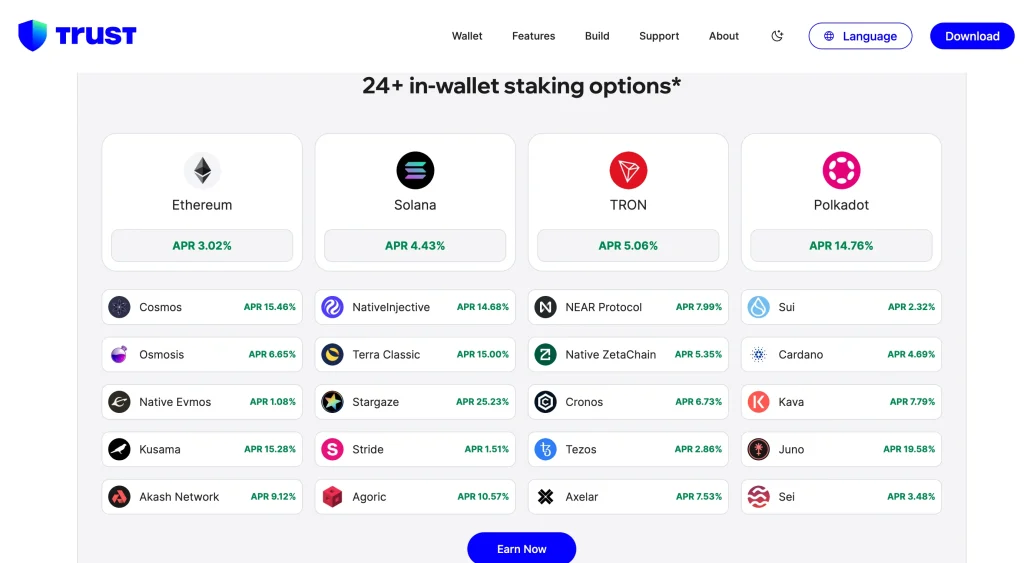
- Staking is available directly in the app for over 24 cryptocurrencies.
- No need for external platforms; staking and earning rewards are convenient and straightforward.
- Great for users looking to earn passive income from a diverse portfolio.
- Perfect for anyone wanting easy, built-in staking capabilities.
Trust Wallet also offers an Earning Estimator tool, helping users calculate potential rewards before staking.
7. NFT Management
MetaMask lets you store and view basic NFTs (non-fungible tokens), mainly those on the Ethereum network. Yet, its support for NFTs on other blockchains is limited, and the interface for managing NFTs is quite simple. This can make it harder to manage NFTs if you own collectibles across multiple blockchains.
Trust Wallet offers a much better NFT experience. It’s a visually appealing gallery that lets you easily view, send, and receive NFTs on several blockchains, such as Ethereum, BNB Chain, and Polygon. The app supports animated and detailed NFT files, making it great for collectors who want to showcase their digital art.
Plus, Trust Wallet connects to popular NFT marketplaces through its built-in dApp browser. This makes buying, selling, and trading NFTs easy without leaving the app.
Cost Analysis: Fees and Hidden Costs
MetaMask and Trust Wallet are free to download and use, with no setup or maintenance fees. However, like all crypto wallets, users will encounter network fees (gas fees) for transactions, which vary depending on blockchain traffic and transaction speed preferences.
MetaMask
- It charges a 0.875% service fee for its built-in Swap feature and standard gas fees.
- When purchasing crypto with fiat (e.g., credit card), third-party provider fees apply; these vary based on the provider used.
- No fees for wallet creation, maintenance, or basic crypto transfers beyond network costs.
Trust Wallet
- Other than standard network fees, do not charge direct wallet fees for swaps or dApp usage.
- Buying crypto with fiat incurs third-party payment processing fees, typically 3.5% to 5%.
- No internal swap fee, making it more cost-efficient for regular DeFi users.
Performance Comparison: Speed, Reliability & Support
Both wallets are designed to deliver fast, secure, and reliable performance. Transaction speed depends mainly on the blockchain network and gas fees selected by the user.
Speed and Reliability
- MetaMask and Trust Wallet are both considered high-performing wallets in transaction execution.
- Transaction confirmation times depend on network congestion and gas fee levels.
- Both teams consistently work on performance optimization to improve user experience and efficiency.
Updates and Development
- MetaMask (by ConsenSys) and Trust Wallet (by Binance) release regular updates to introduce new features, enhance security, and improve usability.
- Their open-source frameworks encourage contributions from the crypto community, ensuring continuous innovation and peer-reviewed improvements.
Customer Support
MetaMask:
- Provides extensive online documentation, FAQs, and a vibrant community forum.
- Direct customer support is limited, but users often find solutions through community-driven resources.
Trust Wallet:
- Offers detailed user guides, FAQ sections, and community forums.
- Backed by Binance, Trust Wallet benefits from a larger support infrastructure and more responsive customer service across multiple channels.
FAQ
How do I withdraw from MetaMask?
Send to exchange: Transfer your crypto to a centralized exchange like Coinbase or Binance, then withdraw to your bank account.
Use fiat on-ramps: Some regions support direct fiat withdrawal through MetaMask’s integrated partners.
Peer-to-Peer: Use P2P platforms to sell directly to other users.
Hardware wallet: Transfer to a hardware wallet for long-term storage.
Is Trust Wallet a hot wallet?
Trust Wallet is a hot wallet, meaning it’s connected to the internet. Yet, it’s a non-custodial hot wallet, which means:
You control your private keys.
Trust Wallet does not hold your funds.
You’re responsible for your seed phrase backup.
It’s more secure than custodial wallets but less secure than hardware wallets.
Is Metamask 100% safe?
No wallet is 100% safe, including MetaMask. However, MetaMask is considered very secure when used properly:
Non-custodial: You control your private keys
Open-source: Code is publicly auditable
Hardware wallet support: Can integrate with cold storage
Regular updates: Continuous security improvements
Security depends on user behavior. Keep your seed phrase secure, verify transactions carefully, and consider hardware wallet integration for large amounts.
Final Verdict: MetaMask or Trust Wallet?
The best crypto wallet depends on your needs and how you plan to engage with the Web3 ecosystem. When comparing MetaMask vs Trust Wallet, it’s clear that both are excellent non-custodial wallets, but each serves different types of users and use cases.
Choose MetaMask if:
- You are deeply involved in the Ethereum ecosystem and EVM-compatible blockchains.
- You frequently interact with decentralized applications on desktop computers via browser extensions.
- You are comfortable with a slightly more technical interface and desire granular transaction control (e.g., custom gas fees).
- You prioritize integration with hardware wallets for the highest level of security.
Choose Trust Wallet if:
- You are a beginner looking for an intuitive, easy-to-use mobile-first experience with a highly user-friendly interface.
- You need broad multi-chain support for a diverse portfolio of cryptocurrencies and NFTs across many blockchains.
- You want convenient in-app staking options for a wide range of assets.
- You prefer seamless NFT management on mobile.
- You would appreciate a direct-swap feature in the wallet without additional fees.
Ultimately, many users find value in using two wallets, leveraging MetaMask for their desktop DeFi interactions on EVM chains and Trust Wallet for broader mobile management and managing digital assets across multiple blockchains.


